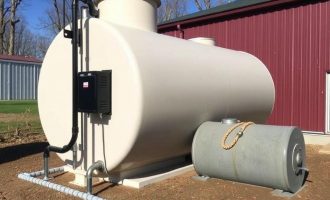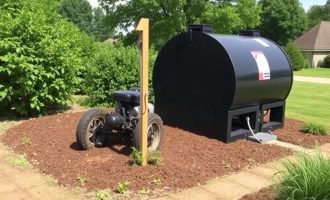Winter brings challenges for homeowners, and one of the hidden yet critical issues is septic system freezing. When temperatures drop below freezing, your septic system—vital for managing household wastewater—can freeze, leading to costly repairs and unpleasant odors. Understanding how to prevent septic system freezing in winter is essential, especially if you live in colder climates or areas with harsh winters. This article will guide you through practical tips, maintenance advice, and preventative methods to keep your septic system functioning smoothly even during the coldest months.
- Understanding Septic Systems and Why They Freeze
- Factors That Increase the Risk of Septic System Freezing
- Table: Key Factors Affecting Septic System Freeze Risk
- Signs Your Septic System Might Be Freezing
- Effective Ways to Prevent Septic System Freezing in Winter
- 1. Maintain Adequate Water Usage
- 2. Insulate Your Septic Tank and Pipes
- 3. Ensure Proper System Depth During Installation
- 4. Protect Your Drain Field
- 5. Avoid Harsh Chemicals
- 6. Consider a Heating Device
- What to Do If Your Septic System Freezes
- Immediate Steps
- Professional Solutions
- Winter Maintenance Checklist for Preventing Septic System Freezing
- Energy-Efficient Tips to Keep Your Septic System Warm
- Common Myths About Septic System Freezing
- Preparing Your Septic System for Upcoming Winter
- When to Call a Professional
- Summary of How to Prevent Septic System Freezing in Winter
- Conclusion
Understanding Septic Systems and Why They Freeze
Before diving into prevention techniques, it’s important to understand how septic systems work and why freezing occurs. A septic system is an underground wastewater treatment structure, commonly used in rural areas without centralized sewer systems. It relies on bacteria to break down waste, and warm soil layers help maintain a steady temperature around the septic tank and drain field.
However, during winter, the soil can freeze, especially if the insulation of the tank and pipes is inadequate or if the ground is exposed. When the ground freezes, the liquids in the septic tank and pipes can freeze as well, blocking the flow of waste and causing system failure. Prolonged freezing can result in backups, costly repairs, and environmental hazards.
Factors That Increase the Risk of Septic System Freezing
Several conditions make septic system freezing more likely in winter:
- Cold Temperatures: Prolonged, severe cold is the primary cause of septic freezing.
- Shallow System Installation: Septic tanks or pipes installed too close to the surface are more vulnerable.
- Low Household Usage: Systems with infrequent water use are less likely to maintain necessary warmth.
- Lack of Insulation: Poorly insulated tanks or pipes easily lose heat to the environment.
- Snow Cover: While snow can act as insulation, lack of snow exposes the system directly to cold air.
Knowing these factors will help you evaluate your system’s risk and take appropriate measures.
Table: Key Factors Affecting Septic System Freeze Risk
| Factor | Description | Impact on Freezing Risk |
|---|---|---|
| Temperature | Severity and duration of cold temperatures | High risk in prolonged sub-zero weather |
| System Depth | How deep the septic tank and pipes are installed | Shallow depth increases freezing risk |
| Water Usage | Amount of water flowing through the system | Low usage reduces warmth, increasing freeze risk |
| Insulation | Presence and quality of insulating materials | Poor insulation increases vulnerability to freezing |
| Snow Cover | Amount of snow covering the system area | Snow provides natural insulation, absence increases risk |
Signs Your Septic System Might Be Freezing
Recognizing early signs of freezing can save you time and money. Here are symptoms to watch out for:
- Slow Drains: Water drains sluggishly, indicating blockage or freezing in pipes.
- Strange Noises: Gurgling sounds from toilets or drains can mean venting problems linked to freezing.
- Backup or Overflow: Wastewater backing up into sinks, tubs, or toilets suggests a blocked or frozen line.
- Foul Odors: Smell of sewage near the septic tank or drain field area.
- Ice Formation: Noticeable ice buildup around the septic tank or pipes outside your home.
If you notice these signs, it’s crucial to act immediately to prevent further damage.
Effective Ways to Prevent Septic System Freezing in Winter
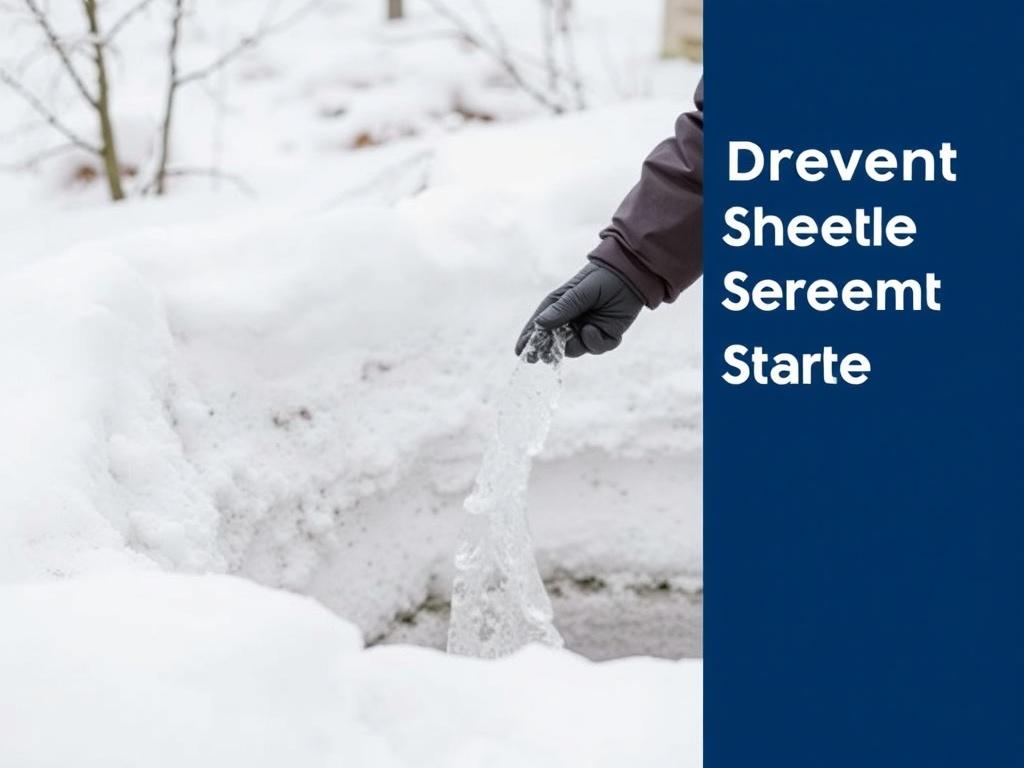
Preventing septic system freezing requires a combination of proper maintenance, insulation, and mindful household habits. Here are proven strategies:
1. Maintain Adequate Water Usage
Your septic system relies on wastewater flow to keep the system warm. Low water flow in winter can lead to freezing. It’s important to not leave the system unused for long periods and to run water regularly. Flushing toilets, running taps, and doing laundry regularly helps keep wastewater moving and the system warm. However, avoid excessive water use, as it can oversaturate the soil around the drain field.
2. Insulate Your Septic Tank and Pipes
Insulation is key to protecting your septic system from damaging cold. Covering exposed parts of the septic system with insulation will help retain heat. This can include:
- Adding straw or mulch over the drain field to provide natural insulation.
- Using foam insulation panels or blankets designed for underground tanks and pipes.
- Ensuring septic tank lids and pipes above ground are properly sealed and insulated.
When using mulch or straw, apply a layer of at least 6-12 inches for effective insulation during colder months.
3. Ensure Proper System Depth During Installation
A septic system installed below the frost line is far less likely to freeze. The frost line is the depth to which the ground freezes during winter, and this varies by region. Consult local building codes and septic professionals to determine the proper installation depth for your area. If your septic tank or pipes are currently too shallow, you can consider adding insulation or redesigning parts of your system.
4. Protect Your Drain Field
The drain field is where liquid waste disperses into the soil and can be vulnerable to freezing. Here are ways to protect it:
- Maintain healthy grass cover over the drain field to trap heat in the soil.
- Do not drive or park vehicles over the drain field to prevent soil compaction.
- Add extra mulch or straw cover when snow is thin or absent to increase insulation.
- Avoid planting trees or shrubs with large roots near the drain field to prevent damage.
5. Avoid Harsh Chemicals
Some homeowners use antifreeze or other chemicals in septic systems to prevent freezing. This is generally discouraged because chemicals can kill the beneficial bacteria that break down waste and harm the environment. Stick to natural prevention methods unless advised otherwise by septic professionals.
6. Consider a Heating Device
For systems at high risk of freezing or during extreme cold snaps, installing a septic system heating cable or a small heater within or near the tank or pipes may be necessary. These devices are designed to maintain a safe temperature in the system without wasting excessive energy.
What to Do If Your Septic System Freezes
If, despite your efforts, your septic system freezes, it’s important to handle the situation carefully to minimize damage.
Immediate Steps
- Avoid using water unnecessarily to prevent worsening backups.
- Do not try to break or thaw frozen pipes mechanically as this can cause cracks and leaks.
- Contact a septic service professional immediately for assessment and repair.
Professional Solutions
Septic professionals can thaw frozen systems safely using methods like hot water flushing, heat lamps, or insulating blankets. They can also identify the root cause of freezing and advise on long-term prevention.
Winter Maintenance Checklist for Preventing Septic System Freezing
To keep your septic system safe during winter, follow this simple maintenance checklist:
| Task | Purpose | Frequency |
|---|---|---|
| Regular water use | Keep wastewater flowing to maintain heat | Daily to weekly |
| Apply mulch or straw over drain field | Provide natural insulation | Before the first frost |
| Inspect septic tank lids and pipes | Ensure proper sealing and insulation | Monthly in winter |
| Clear snow cover periodically | Maintain insulation balance (avoid exposing system) | As needed |
| Schedule septic tank pump out | Prevent solids build-up which can freeze | Every 2-3 years or as needed |
Energy-Efficient Tips to Keep Your Septic System Warm
For eco-conscious homeowners, there are ways to protect your septic system from freezing without increasing energy consumption dramatically:
- Use natural insulators like leaves, straw, or mulch rather than synthetic materials.
- Maximize the use of sunlight to warm exposed parts of the system by removing excessive snow only when needed.
- Ensure your home uses water efficiently, avoiding unnecessary waste which can overload the system.
- Plant insulating vegetation that retains heat over the system but avoid deep root systems.
These strategies not only help prevent freezing but also support a sustainable home environment.
Common Myths About Septic System Freezing
Understanding septic freezing myths helps prevent misinformation and ineffective actions:
- Myth: Pouring antifreeze in the septic tank prevents freezing.
Fact: This harms beneficial bacteria and contaminates the environment. - Myth: Only rural homes with septic systems freeze in winter.
Fact: Septic freezing can affect any system in cold climates regardless of location. - Myth: Covering the septic system with snow remover helps.
Fact: Snow acts as insulation; removing it can increase freeze risk.
Preparing Your Septic System for Upcoming Winter
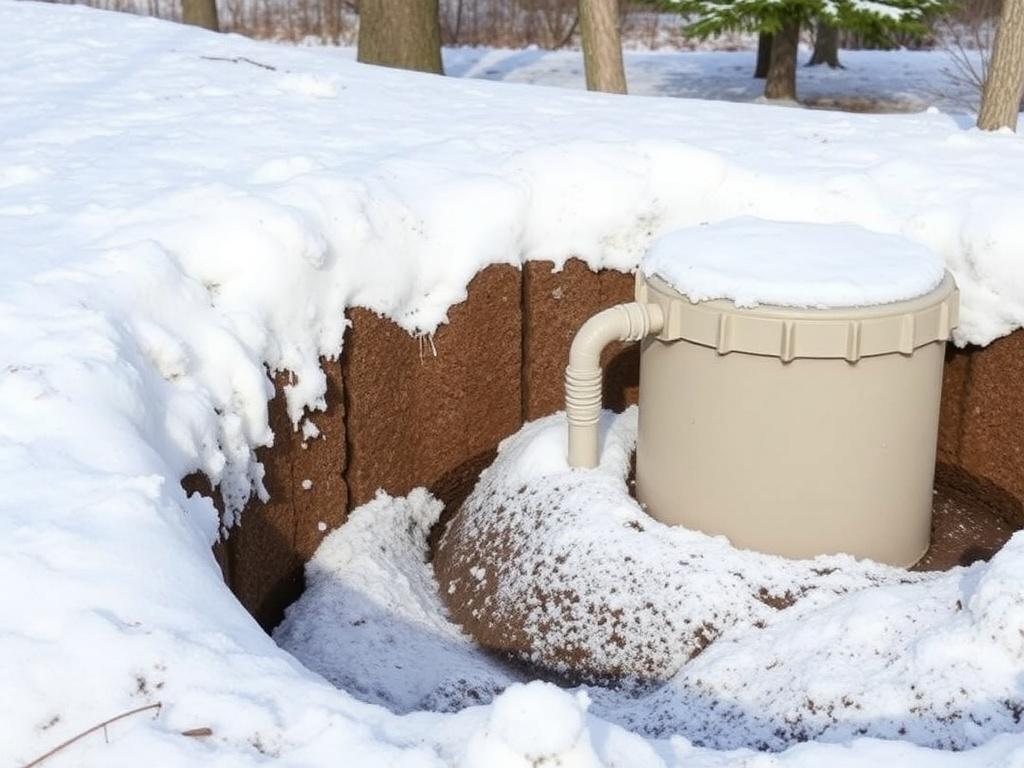
Winter preparation starts in the fall. Some key preparation tips include:
- Get your septic system inspected and pumped if necessary to prevent solids accumulation that can worsen freezing problems.
- Check that lids and pipes are sealed well and insulated.
- Apply a thick layer of mulch or straw over the drain field before the ground freezes.
- Adjust household water usage habits to maintain regular flow through the system.
Taking these proactive steps ahead of winter can save you from headaches and expenses later.
When to Call a Professional
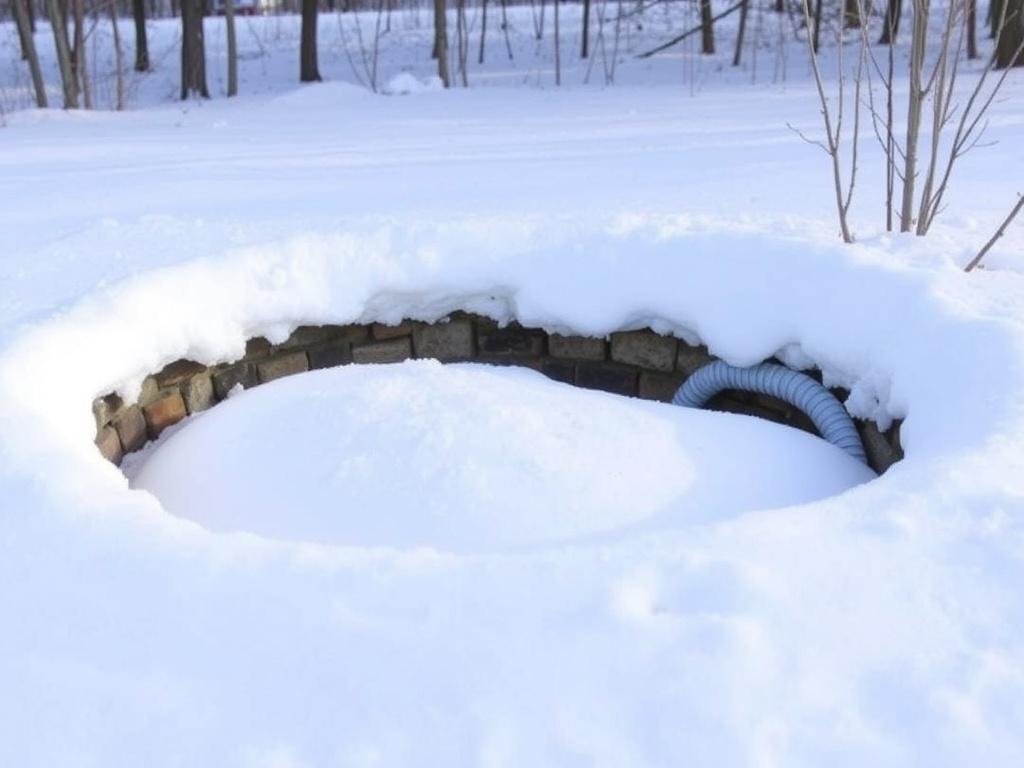
While many preventative measures can be taken by homeowners, consulting a septic professional is wise when:
- You suspect your system has already frozen.
- You notice unusual smells, slow drainage, or flushed wastewater.
- You want advice on proper installation depth or insulation techniques.
- You require a septic tank pumping or major maintenance.
Professional help ensures your system stays in good health and operates safely year-round.
Summary of How to Prevent Septic System Freezing in Winter
Preventing septic system freezing in winter depends on maintaining proper water flow, adequate insulation, system depth, protecting the drain field, and timely maintenance. Using natural insulating materials, avoiding harsh chemicals, and seeking professional advice further enhance prevention. Knowing the signs of freezing and acting early prevents costly repairs and preserves your home’s sanitation.
Conclusion
Winter doesn’t have to bring septic system troubles if you prepare well in advance and understand how to prevent septic system freezing in winter. By keeping waste flowing regularly, adding insulation, protecting vulnerable parts of the system, and paying attention to weather conditions and system health, you can ensure your septic system continues working efficiently throughout the cold months. Remember that every system and location is different, so combining common sense practices with expert advice is the best path to avoiding septic freezing disasters. With these steps, your winter will be comfortable, safe, and free of septic problems!
Помогла вам статья?


